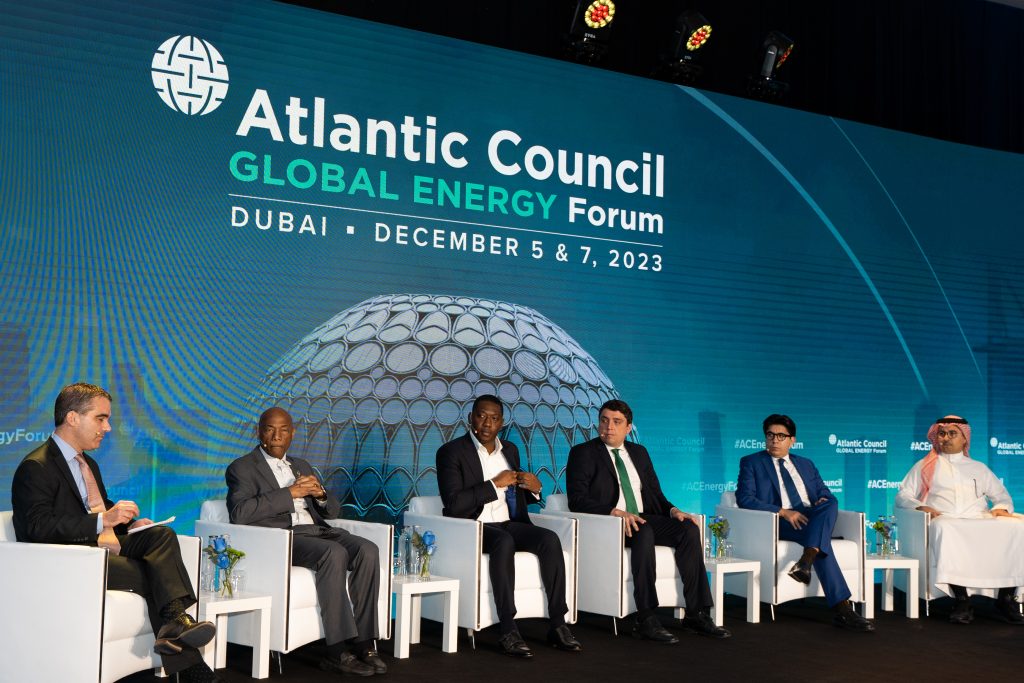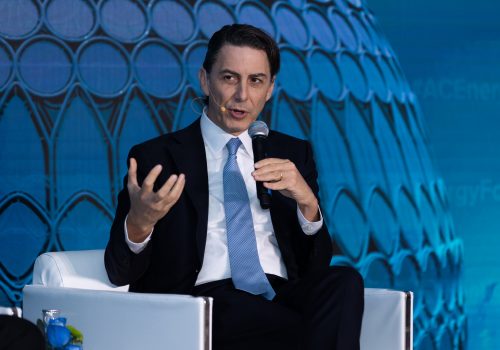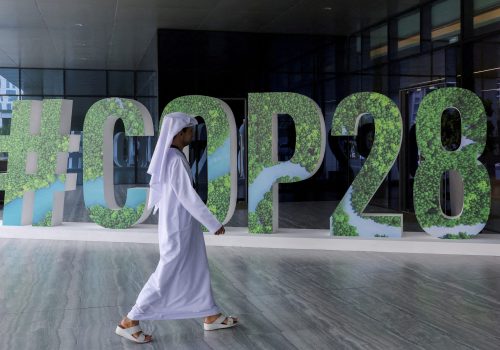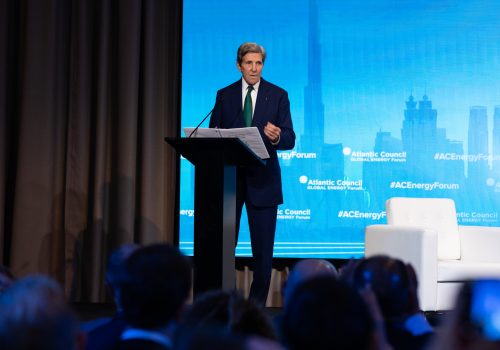Achieving a just energy transition for the Global South may require a complete reversal in the way the world has operated for centuries.
According to Caribbean Development Bank President Hyginus Leon, who spoke at the Atlantic Council’s Global Energy Forum in Dubai on Thursday, the Global North has long benefitted from being the destination for flows of goods, money, and people from the south. “Now,” he explained, “you need a reversal” to “generate equity” and “allow the Global South to grow.”
Herbert Krapa, Ghana’s deputy minister of energy, explained that despite African countries being the source of both fossil fuels and vast critical mineral deposits—both crucial for meeting energy demand—the continent hasn’t been able to leverage them for its own development. “A just transition,” he explained, will require “taking advantage of these resources.”
But for the sake of the climate, he added, it will also require “significant financing” for renewable energy.
Ultimately, Leon explained, the Global South must have a larger voice on the world stage. Otherwise “we are not going to make progress” toward climate goals.
Fahad al-Dhubaib of the Saudi national oil company Aramco argued that Global North countries pinning their hopes on keeping global warming below 1.5 degrees Celsius should focus on the Global South now: “This is our opportunity [to curtail] the potential growth and emissions we could be seeing going forward.”
Below are more highlights from the conversation on energy security among leaders from the Global South, moderated by Jason Marczak, vice president and senior director of the Atlantic Council’s Adrienne Arsht Latin America Center.
A secure energy future
- “The energy transition needs to go as fast as it can,” said Pietro Sampaio Mendes, Brazil’s secretary for oil, natural gas, and biofuels. However, he added, “we will not stop the production of gas . . . we are increasing the production.” Krapa similarly said that while Ghana understands that it will need to transition, it is an expensive endeavor: “We have oil and gas in significant quantities, and will continue to explore that . . . side by side with our transition plan to move more to renewables.”
- Al-Dhubaib noted that the bulk of energy demand in the future will come from the Global South, where the gross domestic product per capita is just shy of seven thousand dollars. So “we shouldn’t take affordability and reliability lightly in the Global South,” he said.
- He explained that since Russia invaded Ukraine in 2022, gas prices and coal demand have skyrocketed, making energy more expensive and less reliable. “Time is not working in our advantage,” he said. When it comes to energy supplies, he argued, “we need everything going forward.” Sampaio Mendes added that in the battle for the climate, “our enemy is the carbon; it is not any technology or the pathway.”
- And according to Marcelino Madrigal, head of the Inter-American Development Bank’s Energy Division, the question about the future of energy security is “more complex” than whether to pursue renewables or fossil fuels. For him, it is also about securing ample energy-production capacity that is accessible to all in the long run.
There will be costs
- Al-Dhubaib argued that as the world switches from oil and gas to renewables, energy “resilience will be quite challenged,” as renewable energy can’t be stored as long and renewable-energy technologies are more expensive upfront—with smaller returns.
- Leon asked: “What good is it to have a high return, and that high return means it only yields our ultimate death?” He continued, “We cannot be arguing that there’s a higher cost to financing something in the realm of renewable energy that saves the planet . . . and then say we cannot do it because the cost is too high.” Madrigal added that, while the energy transition will spread benefits, “there are also costs.”
- Madrigal noted that countries will also need to invest “a lot,” and not just money: In particular, he said that Latin America will need to invest in better rule of law, regulatory instruments, and institutions to create a better environment for private investment. The world’s mission to slow global warming is “a huge opportunity for Latin America,” he explained.
The Global South’s take on COP
- The speakers, all in Dubai for the United Nations climate change conference known as COP28, reflected on the breakthroughs they’ve seen come out of the convening thus far. Leon said that he sees COP as “a process” that leaders “advance as we go along each year,” achieving “pieces along the way.”
- Pointing to a new push to triple renewables and double energy efficiency, Leon cautioned that for that to happen, more finance is needed. While a new thirty-billion-dollar fund from the United Arab Emirates and the loss and damage fund are “welcome,” he said, “the actual investment need is . . . in the range of twenty trillion [dollars]. So there is a humungous gap that is still to be filled.”
- “Those are essentially seed funds,” Krapa added. “The amount of financing that needs to go into remodeling energy systems and energy infrastructure” across Africa is much higher, he warned, adding that the new funds amount to “a drop in the ocean.”
- Krapa said that he is keeping an eye on the global stocktake—an assessment of global climate progress (or lack thereof) that is expected to be completed at COP28. “I think we should be very clear in the outcomes of the stock,” he said, “in terms of the progress or the little progress that has been made . . . we should be bold to confront the truth that the pledges and commitments have not come through.”
Katherine Walla is an associate director on the editorial team at the Atlantic Council.
Further reading
Thu, Dec 7, 2023
The White House’s Amos Hochstein on ensuring energy security amid global crises
New Atlanticist By Daniel Hojnacki
At the Atlantic Council Global Energy Forum in Dubai, Hochstein discussed the United States’ vision for the future of energy security.
Thu, Nov 30, 2023
Expert analysis: The successes and shortcomings in the fight against climate change at COP28
New Atlanticist By
Our experts dispatched to Dubai, where they analyzed how global leaders responded to the greatest challenges posed by climate change.
Wed, Dec 6, 2023
John Kerry unveils a ‘critical’ new US strategy to expand fusion energy
New Atlanticist By Katherine Golden
"We need to pull ourselves together with every strength we have,” Kerry said on the first day of the Global Energy Forum.
Image: A session on energy security and economic opportunity for the Global South at the Global Energy Forum in Dubai, December 7, 2023.



